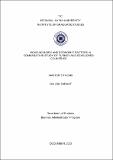DSpace Repository
HOUSING INDEX AND ECONOMIC FACTORS: A COMPARATIVE STUDY OF TURKEY AND DEVELOPED COUNTRIES
JavaScript is disabled for your browser. Some features of this site may not work without it.
| dc.contributor.author | SADAAT, Said Aziz
|
|
| dc.date.accessioned | 2023-12-25T13:52:57Z | |
| dc.date.available | 2023-12-25T13:52:57Z | |
| dc.date.issued | 2023 | |
| dc.identifier.uri | http://hdl.handle.net/11547/11033 | |
| dc.description.abstract | A statistical tool used to monitor changes in the cost of residential real estate properties within a given nation or geographic area refers to the housing index. Typically, data is compiled from multiple sources to compute it. It is a helpful tool for spotting real estate market trends and helping you decide whether to buy or sell a property. Housing indices are frequently used by real estate professionals and investors to monitor the performance of their real estate portfolios, determine possible investment opportunities, and evaluate the state of local real estate markets. In order to evaluate the trend comparison between developed and developing countries, this study compared the housing index of Turkey with those of three highly developed nations the United States, the United Kingdom, and Germany. I take into consideration the GDP, population, interest rate, unemployment rate, and debt of those nations and look at how they affect the housing index. Regression analysis was used to analyze the effects using time series secondary data of those nations and the aforementioned factors from 1982 to 2021. The results of the study demonstrated that Turkey's housing index pattern differs from that of developed nations in that interest rates, unemployment rates, and debt are the primary determinants of the housing index in Turkey, in contrast to the United States, where GDP is also a significant determinant of the housing index. Furthermore, it has been determined that debt has a negative impact on the housing index in Turkey, whereas in developed nations, debt has a positive impact. Additionally, it was discovered that the housing index for the UK and Germany was not significantly influenced by interest rates, and that these two nations' GDP and population sizes were additional predictors. In contrast with other developed and developing countries, the UK's unemployment rate was found to negatively affect the housing index. | tr_TR |
| dc.publisher | İSTANBUL AYDIN ÜNİVERSİTESİ LİSANSÜSTÜ EĞİTİM ENSTİTÜSÜ | tr_TR |
| dc.title | HOUSING INDEX AND ECONOMIC FACTORS: A COMPARATIVE STUDY OF TURKEY AND DEVELOPED COUNTRIES | tr_TR |
| dc.type | Thesis | tr_TR |
Files in this item
This item appears in the following Collection(s)
-
Tezler -- Thesis [3536]
